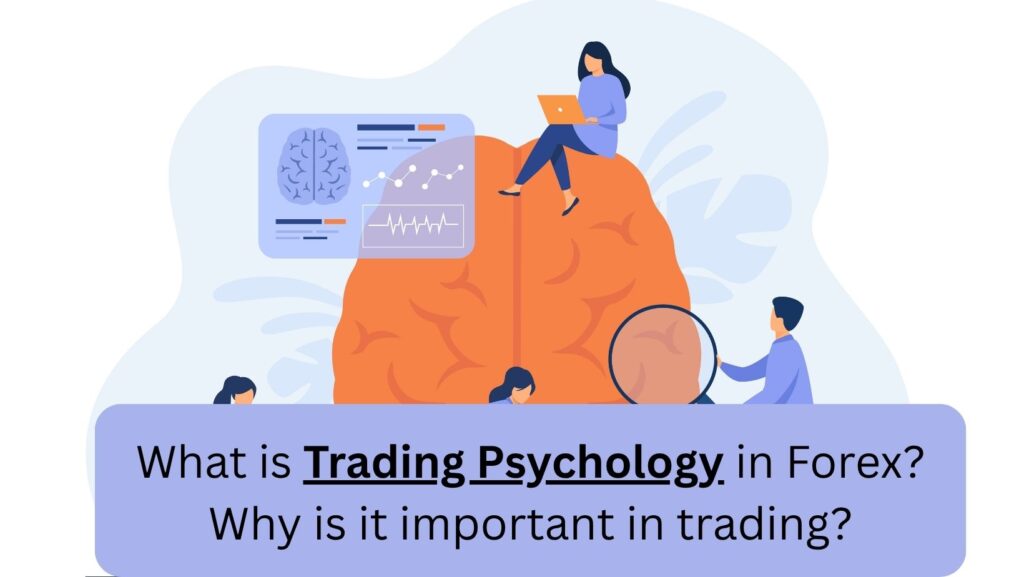Forex trading is not just a game of charts and indicators – it is even more important to control your mindset and emotions.
Often traders do market analysis correctly, but emotions such as fear, greed, overconfidence, revenge trading become the cause of their losses.
In this blog, we will explain in detail:
- What is trading psychology?
- What are the common emotional mistakes?
- How can you develop your discipline?
- Tips for controlling your mind for successful trading

What is trading psychology?
Trading psychology is:
“Your emotions, behavior, and decision-making process when you trade the market.”
A successful trader is not only technically strong, but also mentally stable.
Common emotional mistakes in trading
1. Fear
- Hesitation to take a position
- Fearing the market after a stop loss is too soon
- Regret after a lost trade
2. Greed
- Not closing a trade even after a profit
- Overtrading
- Taking more risk in pursuit of “quick money”
3. Retaliation
- Taking a trade immediately after a loss to “get even”
- Making emotional decisions
4. Overconfidence
- Breaking the rules after one or two good trades
- Taking a large lot size without analysis
5. Impatience
- Not waiting for a signal
- Trading all the time on impulse
- FOMO (Fear of Missing Out)
Why is emotional control important?
| Problem | Effect on Trading |
| Fear | Missed opportunities, low profits |
| Greed | Wipe out profits, big losses |
| Overconfidence | Loss of discipline, wipe out capital |
| Revenge Trading | Account blow |
| Impatience | Random entries, no strategy follow |
👉 An emotionally stable trader can become a consistently profitable trader.
How to develop a strong trading psychology?
1. Make a trading plan and follow it
- Entry, exit, SL, TP should be predetermined
- Do not make any decisions outside the plan
2. Strictly follow risk management
- Keep a fixed risk (1-2%) in each trade
- Keep a calm mind even after a loss
3. Keep a daily trading journal
- Write down each trade: why you took it, what was the result
- Record your emotions: what you felt, what you felt
4. Take breaks when your mind is not stable
- Avoid trading in anger, stress or distraction
- The market opens every day, peace of mind should be a priority
5. Backtesting and Demo Practice – Best Platform
- You only trust your strategy when you have tested it
- Demo gives you confidence
🧘♀️ Mental habits that make a trader strong
| Habit | Benefit |
| Meditation or deep breathing | Emotion control, calmness |
| Healthy routine | Good focus & decision-making |
| Accepting losses | Maintains confidence |
| Focus on consistency | Long-term growth and discipline |
| Distancing from social media | Avoid FOMO |
Real example:
A trader traded EUR/USD, placed an SL of 30 pips. The price reached the SL. He got angry and traded in the opposite direction with 2x the lot size → suffered a loss again.
Result? The account was halved in 1 day. Not just the analysis – the mindset failed.
Trading affirmations
Repeat some positive affirmation every morning or before every trade:
- “I believe in my plan.”
- “Loss is part of trading, I learn.”
- “I will not overtrade.”
- “I will only make system-based decisions.”
This method trains your subconscious.
❓ F A Q
Question 1: Can emotions be completely controlled?
Answer: Not 100%, but their influence can be reduced through discipline and habits.
Question 2: Is it important for beginners to learn trading psychology?
Answer: Absolutely. Early habits form the basis of future success/failure.
Answer 3: Does meditation help in trading?
Answer: Yes, because meditation improves your focus and emotional balance.

🧾 Conclusion
Success in Forex trading is not just about strategy – it comes from mindset, patience, and discipline.
🧘♂️ The calmer you become as a trader, the more consistent and secure your trading career will be.
Remember: Trading is a mental game – charts are just tools!
So if you liked this blog then follow and share www.growthlikej.com for similar informative knowledge blogs.

